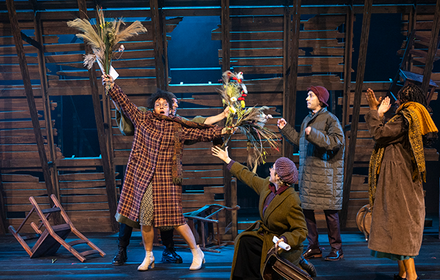Professor Sir Jonathan Bate CBE is the author of several award-winning works on Shakespeare, including the theatrical memoir, Mad About Shakespeare. Sydney writer Andy McLean caught up with Jonathan to discuss A Midsummer Night’s Dream.
Andy McLean: With its humour, romance and magic, A Midsummer Night’s Dream seems like the perfect “entry point” for young people who have never seen Shakespeare, don’t do you think?
Jonathan Bate: Yes undoubtedly. In Mad About Shakespeare I write about Julius Caesar being the first Shakespeare play I ever saw when I was 14 and it really put me off. Because Julius Caesar has no jokes and no sex – it’s all about politics! I mean, now, I’m fascinated by politics, and I think Julius Caesar is a terrific play. But I wish A Midsummer Night's Dream had been my first Shakespeare play.
AM: Right from the start, A Midsummer Night’s Dream is a celebration of theatre. Just as we, the audience, leave our “real world” to enter a story – the characters in this play are quickly transported from the city of Athens into a magical, mysterious forest, aren’t they?
JB: Yes, we begin in the Duke of Athens’ court with the hierarchies of society – a father insisting his daughter must marry one person and not another. Then we escape into the world of the forest at night. It’s kind of like a mirror world and that’s often emphasised by the actors playing Theseus and Hippolyta [in Athens] doubling as the actors who play Titania and Oberon [in the forest].
We really get a sense of going into an alternative world, where everything seems strange and out of control. A place where a guy seems to turn into a half-donkey and then make love with a fairy queen. It’s a wild place.
AM: The theatricality of the play is amped up even further in Bell Shakespeare’s 2024 production. Eight actors play all the parts and you can actually see the actors changing costumes on stage.
JB: Yes, that’s very true to the play itself. Because if you think about the “play within a play” [where Bottom and his friends perform a hammy tragedy for the Athenian nobles], the characters in the audience kind of say, “Let’s respect these actors and not mock them”. There’s a sense that theatre is a special place where the rules are somewhat different. In the audience, however absorbed you are, at least part of your brain knows you are watching a performance, and that these people are playing parts and putting on costumes.
As Samuel Taylor Coleridge said, the whole basis of theatre is that willing suspension of disbelief, which is like a dream. But when you awaken, it gives you insights to take back into real life.
In A Midsummer Night’s Dream, there’s that great scene when the lovers awaken, leave the forest, and it seems like it was all an illusion, but they’ve been changed by the experience. [Demtrius says: “Are you sure / That we are awake? It seems to me / That yet we sleep, we dream.”]
AM: You mentioned that most of the action in the play takes place at night, which is interesting because another thing that stands out in Bell Shakespeare’s production is the inherent darkness in this comedy. Under threat of death, young people flee into a forest at night which – in William Shakespeare’s time – would have been pitch black.
JB: Yes, it’s interesting because the darker elements of the play are sometimes underestimated. The moment you start talking about fairies today, we might think of Tinkerbell in Peter Pan or something. But that’s not how spirits were thought of in Shakespeare’s day. Back then, spirits were kind of sinister figures – Robin Goodfellow [aka Puck] especially.
Shakespeare grew up on the fringes of the Forest of Arden with all the folklore of fairies as mischievous figures who stole children from their cradle and so forth. So that’s something that got rather lost when the idea of fairies later became sentimentalised.
A Midsummer Night’s Dream isn’t just a lovely little fairy story. There’s a lot of dark stuff here and I think that does need to be brought across. The happy ending – the unravelling of confusion – is all the more magical if there has been a real sense of danger and potential death in there.
Bell Shakespeare’s production of A Midsummer Night’s Dream is touring nationally. Among many venues, the production will visit the State Theatre Centre of WA (17–20 Apr), Arts Centre Melbourne (25 Apr–11 May) and Canberra Theatre Centre (7–15 Jun).





